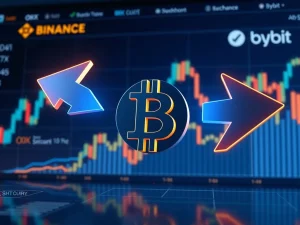Shocking Pi Network Token Crash: Plummets 65% After Mainnet Launch – Is Legitimacy in Question?

Hold onto your hats, Pi Network enthusiasts! What was anticipated as a celebratory moment has turned into a dramatic downturn. The Pi Network token experienced a staggering crypto crash, plummeting a shocking 65% immediately following its highly anticipated mainnet launch. This sudden freefall has sent ripples of concern throughout the crypto community, raising serious questions about the future of the project and the value of the Pi token.
What Triggered the Pi Network Token’s Dramatic Crash?
While the mainnet launch was expected to inject new life and legitimacy into the Pi Network, the opposite seems to have occurred. Several factors could be contributing to this precipitous decline. Market analysts point towards:
- Profit-taking Frenzy: Many early adopters who accumulated Pi tokens through mining may have chosen the mainnet launch as the opportune moment to cash out, leading to a massive sell-off. This classic ‘pump and dump’ scenario can decimate token value rapidly.
- Legitimacy Concerns: Long-standing questions about the Pi Network’s actual utility and the lack of clear use cases beyond its closed ecosystem have resurfaced. The mainnet launch, instead of dispelling doubts, may have amplified them as users faced the reality of limited token functionality outside the Pi Network itself.
- Broader Market Sentiment: The overall cryptocurrency market can be volatile. While Bitcoin and Ethereum have shown resilience, altcoins like Pi Network are often more susceptible to market fluctuations and negative news. Any broader market correction could exacerbate the token’s downward trend.
- Lack of Exchange Listings: Despite the mainnet launch, major cryptocurrency exchanges have yet to list the Pi Network token. This lack of accessibility severely restricts trading and price discovery, potentially contributing to the price instability and negative market perception.
Bybit CEO Challenges Pi Network’s Legitimacy Amidst ‘Scam’ Allegations
Adding fuel to the fire, prominent figures in the crypto space are openly questioning Pi Network’s credibility. Ben Zhou, the CEO of leading cryptocurrency exchange Bybit, has publicly challenged Pi Network to address serious allegations. These allegations stem from a Chinese media report that labeled the project a “scam,” accusing it of targeting elderly individuals with misleading promises and complex technological jargon.
Zhou’s challenge is direct and impactful. He demands that Pi Network transparently address these scam accusations and demonstrate genuine utility and value beyond mere speculation. This public scrutiny from a respected industry leader significantly amplifies the pressure on Pi Network to prove its legitimacy and regain the trust of the crypto community.
Is the Pi Network Token Really a Scam? Understanding the Accusations
The “scam” label is a serious accusation in the cryptocurrency world. Let’s break down the core concerns and allegations leveled against Pi Network:
| Concern | Description |
|---|---|
| Unclear Value Proposition | Critics argue that Pi Network lacks a clear and compelling use case. While it promises a decentralized future, the actual functionality of the Pi token and its ecosystem remains vague and underdeveloped. |
| Centralized Control | Despite claiming decentralization, concerns persist about the Pi Network’s centralized control over the token distribution and development. This contradicts the ethos of true cryptocurrencies. |
| Data Harvesting | Some accuse Pi Network of primarily functioning as a data harvesting operation. Users are encouraged to provide personal information to mine Pi tokens, and the platform’s data usage policies have faced scrutiny. |
| Marketing Tactics | The project’s marketing, particularly targeting less tech-savvy individuals, has been criticized for being overly promotional and potentially misleading, creating unrealistic expectations of easy wealth generation. |
Can Pi Network Recover From This Crypto Crash and Legitimacy Crisis?
The path forward for Pi Network is fraught with challenges. To recover from this devastating crypto crash and the growing legitimacy crisis, Pi Network needs to take decisive and transparent actions. Key steps include:
- Addressing Scam Allegations Directly: A comprehensive and public response to the “scam” accusations and Ben Zhou’s challenge is crucial. This response must be backed by concrete evidence and demonstrable actions.
- Demonstrating Tangible Utility: Pi Network needs to showcase real-world applications and use cases for the Pi token beyond its internal ecosystem. Partnerships, integrations with existing platforms, and the development of genuinely useful decentralized applications are essential.
- Decentralization Efforts: Moving towards greater decentralization of the network’s governance and token distribution would address a major criticism and build trust within the crypto community.
- Exchange Listings: Securing listings on reputable cryptocurrency exchanges is paramount for price discovery, liquidity, and broader market acceptance. This would require demonstrating compliance and meeting exchange listing criteria.
The Future of Pi Network: A Warning Sign for Altcoin Investors?
The dramatic Pi Network token crash serves as a stark warning for investors in the volatile altcoin market. It underscores the importance of due diligence, understanding the underlying technology and value proposition of a project, and being wary of projects that rely heavily on hype and lack clear utility. While the promise of easy crypto gains can be seductive, the Pi Network saga highlights the inherent risks and the potential for significant losses, even after much-anticipated events like a mainnet launch.
For Pi Network to survive and thrive, it must overcome significant hurdles. The mainnet launch, intended to be a triumphant milestone, has instead become a critical juncture. Whether Pi Network can navigate this crisis and prove its legitimacy remains to be seen. The crypto world will be watching closely.









